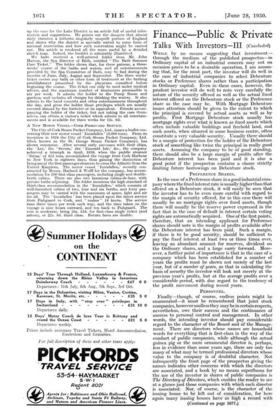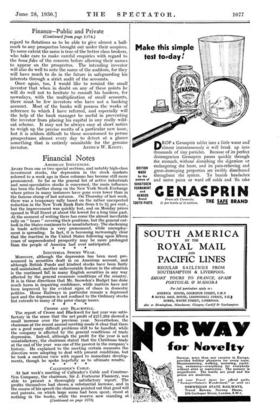Finance Public & Private
Talk s With Investors—III (Concluded) WHILE by no means suggesting that investment— through the medium of the published prospectus—in Ordinary capital of an industrial concern may not on occasion prove to be a desirable operation, I am assum- ing that, for the most part, the investor will do well in the case of industrial companies to select Debenture stocks or Preference Shares rather than a participation in Ordinary capital. Even in- these cases, however, the prudent investor will do well to note very carefully the nature of the security offered as well as the actual fixed interest offered on the Debenture stock or the Preference share as the case may be. With Mortgage Debenture issues attention should be given to the extent to which the principal is covered by actual assets as well as by profits.' First Mortgage Debenture stock usually has mortgage rights over what is known as fixed assets which often include valuable buildings and freehold land, and such assets, -when Situated in some business centre, often constitute a very valuable security. Usually there should be a margin of protection for the holder of the Debenture stock of something like twice.the principal in really good assets. Assuming the company to be of good standing, there should also be a large margin of profits after the Debenture interest has been paid and it is also a good point if the prospectus contains a clause strictly limiting. future borrowings on Debenture stock.
- PREFERENCE SHARES.
In the case of a Preference share in a good industrial com- pany where the fixed interest rate is usually higher than that offered on a Debenture stock, it will easily be seen that the investor has to be even more careful with regard th the margin of security offered, for in this case there will usually be no martgage rights over fixed assets, though there will usually be the reserve power expressed in the fact that in the ease of default in interest certain voting rights are automatically acquired. One of the first points, therefore, that an intending applicant for Preference -shares should note is the margin of profits available after the Debenture interest has been paid. Such a margin, if there is to be good security, should be sufficient to pay the fixed interest at least two or three times over, leaving an abundant amount for reserves, .dividend on the Ordinary shares, and a large cariy forward.--- More- over, a further point of importance is that in the case of a company which has been established for a number of years the profits must be shown not merely of the last year, but of a number of years, so that in calculating the basis of security the investor will look not merely at the previous year's profits, but at the average profits over a considerable period, with, due regard to the tendency of the profit movement during recent years.
•
PERSONNEL.
Finally—though, of course, endless points might be enumerated—it Must be remembered that joint stock companies, however soulless they may be in certain respects, nevertheless, owe their success and the continuance of ' success to personal control and management. In other words, the intending investor should pay considerable regard to the character of the Board and of the Manage- ment. There are directors whose names are household words for everything that is first-class in the way of the conduct of public companies, while although the actual guinea-pig or the mere ornamental director is, perhaps, less in -evidence than some years ago, there are only too many Of what may be termed professional directors whose value fo the company is of doubtful character. Not infrequently the front page of the prospectus giving the names indicates other concerns with -which the directors are associated, and a book by no means superfluous for the use of the investor in 'shares of public companies is The- Directory ofDireCtorS, which enables the reader to see at a glance just those companies with which each director is associated: Noll of course, is the character of the issuing house to be left out of consideration, for here again 'Many issuing houses haire- §o_ high a record with (Continued on page 1077.)
Finance—Public and Private (Continued from page 1974.)
regard to flotations as to be able to give almost a hall- mark to any prospectus brought out under their auspices. To some extent the same is true of the better class brokers, who take care to make careful enquiries with regard to the bona fides of the concern before allowing their names to appear on the prospectus. The intending investor will also do well to note the name of the auditors, for they will have much to do in the future in safeguarding his interests through a strict audit of the accounts. Once again, too, I would like to remind the small investor that when in doubt on any of these points he will do well not to hesitate to consult his bankers, for nowadays, with the multiplication of small accounts, there must be few inveStors who have not a banking account. Most of the banks will possess the works of reference to which I have referred, and especially will the help of the bank manager be useful in preventing the investor from placing his capital in any really wild- cat scheme. It may not be always easy at short notice to weigh up the precise merits of a particular new issue, but it is seldom difficult to those accustomed to peruse prospectuses almost every day to detect at a glance something that is entirely unsuitable for the genuine



















































 Previous page
Previous page